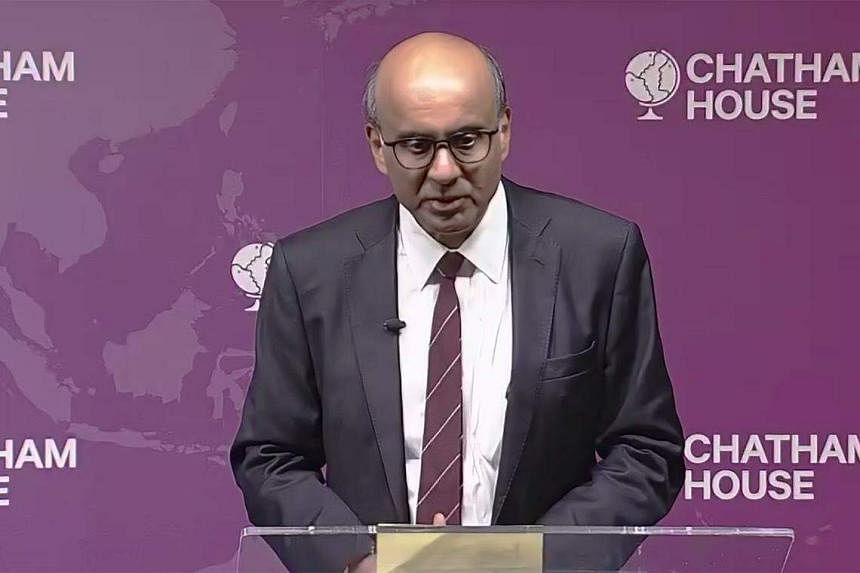
Senior Minister Tharman Shanmugaratnam said that countries should not sacrifice absolute economic performance to secure relative performance.
PHOTO: CHATHAM HOUSE
Goh Yan Han
Political Correspondent
SINGAPORE - Countries should not seek to establish a relative lead over each other internationally by protectionist means, because doing so would compromise their own “absolute performance” and ability to maximise their people’s opportunities so that ordinary working people can benefit, said Senior Minister Tharman Shanmugaratnam on Tuesday evening.
Speaking at a dialogue in London organised by Chatham House on strategies for a more resilient world, he described how, for example in the context of United States-China relations, strategies should not sacrifice absolute economic performance – which is what matters for ordinary workers – just to secure a relative edge over each other.
He pointed out that while protectionist strategies can achieve the latter, they hurt the former.
“If we go for a system that is protectionist, that imposes restrictions on competitors, or where your actions domestically have negative spillovers on the rest of the world, you might be able to preserve relative superiority, at least for some period of time,” said Mr Tharman.
“But it is almost certainly at the cost of absolute performance everywhere. Most economists would agree on that.”
He added that the ordinary worker depends on absolute performance – through the growth of an economy, jobs being created, the quality of jobs being created, and opportunities for social mobility.
“It’s not about how well this economy is doing relative to another economy somewhere else in the world. That doesn’t improve the life of ordinary workers... absolute performance and the international game in which if I win, you don’t need to lose, should be the way forward,” he added.
When asked about how a government should go about making its country attractive amid an era of rapid change, Mr Tharman described how to best carry out social policies and also ensure economic competitiveness.
He noted that many advanced countries have essentially run out of fiscal space to fund benefits for everyone at the same time.
“They have to face the task of targeting spending to help those more in need.”
He added that this was especially because governments could not avoid increased spending on healthcare, which was the biggest fiscal challenge in the advanced world because of ageing.
Singapore has utilised a strategy that is progressive, by supporting the poor more, and ensuring that the upper-middle-income and the rich pay for their share in healthcare costs.
“Either you do that, or you have to ration healthcare by having very long queues or having some people go abroad for treatment, which is not fair and not progressive,” he said.
He added that insurance was needed to pool healthcare risks. “But if you go for the ultimate insurer being government – the government simply paying for all costs, you end up with an ever-increasing bill that has to be met by taxing everyone more.”
This ties in with economic competitiveness as well, he said. In looking to improve absolute performance for one’s country rather than holding others down so as to stay ahead, countries should spend 90 per cent of their efforts building up the capabilities of their people, and 10 per cent making sure that no one else is abusing their position in the global system.
“Right now, we’re very far from that mix. There’s very little effort being made to develop the capabilities of domestic populations, starting from the earliest years of life, where the gaps once entrenched last all the way through life.”
Goh Yan Han
Political Correspondent
SINGAPORE - Countries should not seek to establish a relative lead over each other internationally by protectionist means, because doing so would compromise their own “absolute performance” and ability to maximise their people’s opportunities so that ordinary working people can benefit, said Senior Minister Tharman Shanmugaratnam on Tuesday evening.
Speaking at a dialogue in London organised by Chatham House on strategies for a more resilient world, he described how, for example in the context of United States-China relations, strategies should not sacrifice absolute economic performance – which is what matters for ordinary workers – just to secure a relative edge over each other.
He pointed out that while protectionist strategies can achieve the latter, they hurt the former.
“If we go for a system that is protectionist, that imposes restrictions on competitors, or where your actions domestically have negative spillovers on the rest of the world, you might be able to preserve relative superiority, at least for some period of time,” said Mr Tharman.
“But it is almost certainly at the cost of absolute performance everywhere. Most economists would agree on that.”
He added that the ordinary worker depends on absolute performance – through the growth of an economy, jobs being created, the quality of jobs being created, and opportunities for social mobility.
“It’s not about how well this economy is doing relative to another economy somewhere else in the world. That doesn’t improve the life of ordinary workers... absolute performance and the international game in which if I win, you don’t need to lose, should be the way forward,” he added.
When asked about how a government should go about making its country attractive amid an era of rapid change, Mr Tharman described how to best carry out social policies and also ensure economic competitiveness.
He noted that many advanced countries have essentially run out of fiscal space to fund benefits for everyone at the same time.
“They have to face the task of targeting spending to help those more in need.”
He added that this was especially because governments could not avoid increased spending on healthcare, which was the biggest fiscal challenge in the advanced world because of ageing.
Singapore has utilised a strategy that is progressive, by supporting the poor more, and ensuring that the upper-middle-income and the rich pay for their share in healthcare costs.
“Either you do that, or you have to ration healthcare by having very long queues or having some people go abroad for treatment, which is not fair and not progressive,” he said.
He added that insurance was needed to pool healthcare risks. “But if you go for the ultimate insurer being government – the government simply paying for all costs, you end up with an ever-increasing bill that has to be met by taxing everyone more.”
This ties in with economic competitiveness as well, he said. In looking to improve absolute performance for one’s country rather than holding others down so as to stay ahead, countries should spend 90 per cent of their efforts building up the capabilities of their people, and 10 per cent making sure that no one else is abusing their position in the global system.
“Right now, we’re very far from that mix. There’s very little effort being made to develop the capabilities of domestic populations, starting from the earliest years of life, where the gaps once entrenched last all the way through life.”
‘Friendshoring’ of supply chains will be costly for everyone: Asian leaders at Nikkei forum
Breaking up is hard to do: US-China trade and investment grow despite tensions
Employers are also not investing enough in ordinary working people through their careers. This cannot be left to the market, which always has a short-term lens as an employer is mainly interested in what a worker could do today, rather than prepare the worker for a new technology or job with another employer, he added.
“There is a basic market failure. The state has to step in, and this has to be an opportunity for the state, private sector, unions and people themselves to collaborate to invest in people regularly through their working lives, so as to keep upskilling, reskilling and making sure that the quality of jobs that are available to them goes up,” he added.
“It’s a most neglected element of public policy in too many countries.”
Countries should start thinking about domestic capabilities, skills, and human potential as fundamental to both social and economic policies, including economic competitiveness, rather than thinking about what they can do to hold adversaries down, he said.
“Focus first and foremost on what we can do to maximise our own capabilities.”
Mr Tharman also spoke on how the real challenge in getting governments to change their policy approaches lies in re-creating a robust “politics of the centre”.
“That is a challenge for both those who are left of centre and right of centre, but not far left and far right. We’ve got to find a way… (to) address the needs of the working class and avoid the extreme right taking over,” he said.
“It has fundamentally been a failure of the left, to address the needs of ordinary working people, and has allowed the far right in many advanced countries to win them over... Likewise, the right of centre needs to have a strategy that’s not just about free markets and keeping taxes low, or talking about individual responsibility.”
He added: “It’s not as if societies have weakened because of an upsurge in individual irresponsibility. People haven’t become suddenly more irresponsible. We face challenges now that require a more active role for the state.”
S’pore to plug deeper into global markets to drive economy and jobs
Smaller nations stress support for multilateralism, principle of sovereign equality
President meant to preserve integrity of system
Mr Tharman also clarified the role of the President in response to moderator Bronwen Maddox, chief executive of Chatham House.
She had, in her introduction, mentioned that he had recently announced his plans to run as a candidate in the upcoming Presidential Election.
She said the role of the President in Singapore was a “crucial non-party-affiliated role in Singapore, a position that allows that person to challenge the Government on behalf of the people”.
Mr Tharman clarified that the role of the President is not to challenge the Government on behalf of the people.
Rather, “the President is elected directly by the people in order to preserve the integrity of the Singapore system, financial integrity as well as the integrity of key appointments of the public service”, he said.
“It’s a very important innovation in our democratic system that we embarked on a few decades ago, and one that I’m offering to put myself forward.” He added that he did not wish to say more about the matter beyond clarifying this.
Singapore’s Tharman urges US, China to abandon ‘hubris’ of viewing own system as superior
Tharman says there are ‘no saints’ in US-China relations and calls on the superpowers to cooperate in areas of common ground, such as ensuring fair trade
US politics since 2016 had occasioned a ‘step change’ in how China is increasingly viewed as a threat and such ‘politics of pessimism and grievance’ must be redressed, Tharman adds
Bhavan Jaipragas
13 Jun, 2023
SCMP
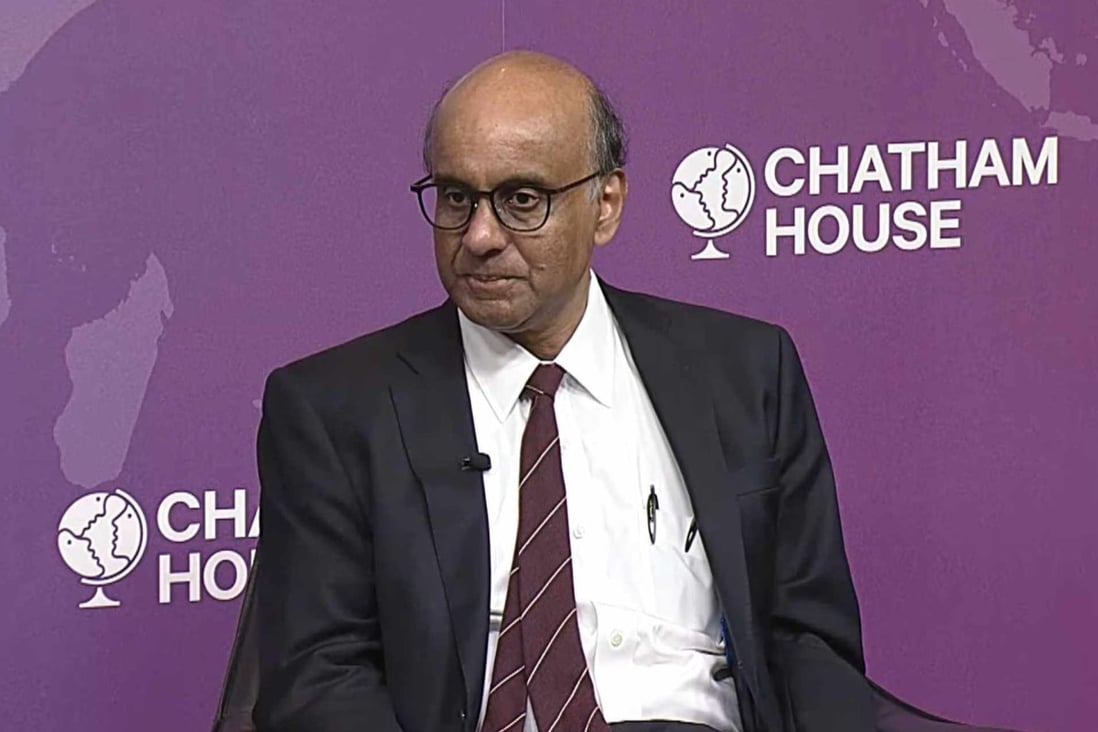
Singapore’s Senior Minister Tharman Shanmugaratnam at the Chatham House dialogue session on June 13, 2023. Photo: Handout
The United States and China should abandon the “hubris” of claiming superiority of their respective political systems and instead should focus on collaborating to advance their self-interests, top Singapore minister Tharman Shanmugaratnam has said.
Speaking at the Chatham House think tank in London on Tuesday, the senior minister echoed calls made by other regional leaders for the superpowers to cooperate in areas where they had common ground.
Tharman, who is Coordinating Minister for Social Policies, is among a handful of senior Singapore ministers whose views on US-China ties are parsed by international observers as a means to understand the prevalent middle-ground view about the superpowers in Southeast Asia.
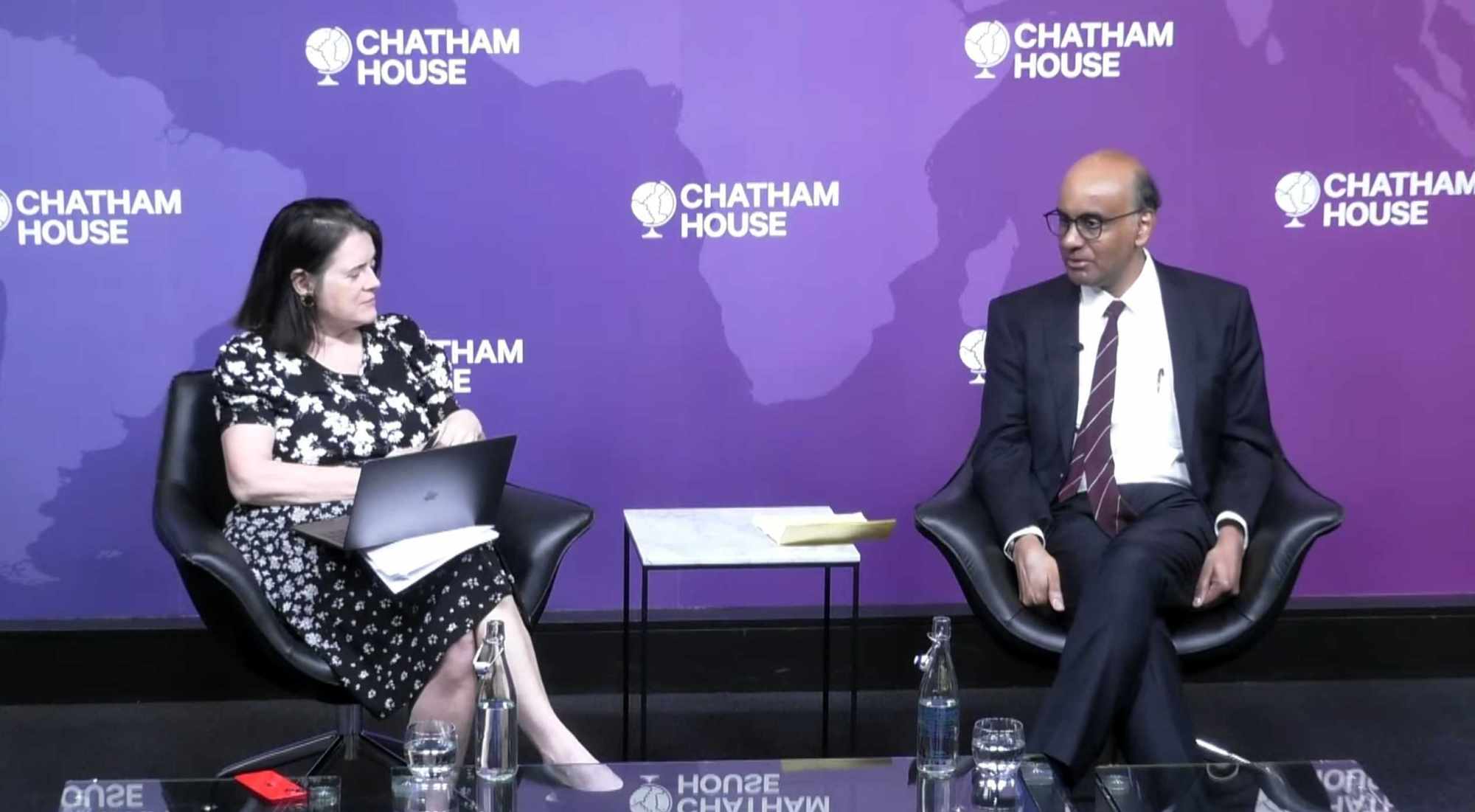
Singapore’s Senior Minister Tharman Shanmugaratnam says China is deeply inserted in the liberal economic order and has a deep interest in its preservation. Photo: Handout
The 66-year-old last week announced he was stepping down from the long-dominant People’s Action Party (PAP) to run for the largely ceremonial position of president – a role he said he would use to “project Singapore’s interests and voice of reason in an increasingly turbulent world”.
Asked during a question-and-answer session on what advice he would give to the leaders of China and the US, said “there were no saints” in the relationship between the superpowers.
“Both of them need to make adjustments. Both of them need to avoid a sense of hubris with regard to the superiority of their own systems,” Tharman said.
“And both of them need to recognise that there’s actually a great deal in common in the way they go about trying to improve lives and grow incomes,” the minister said, noting that China, unlike the erstwhile Soviet Union, was “deeply inserted in the liberal economic order and has a deep interest in its preservation”.
“Those are huge grounds for seeing eye to eye and developing rules to make sure that trade is fair, investment is fair and intellectual property is protected. These are rules that can be developed,” Tharman said.
The absence of a strategy of interdependence would not necessarily mean that China “gradually withers away”, he said.
“It eventually rises anyway … but when it finally gets there it will know who made it extremely difficult for it to get there. That makes for a dangerous world,” he said.
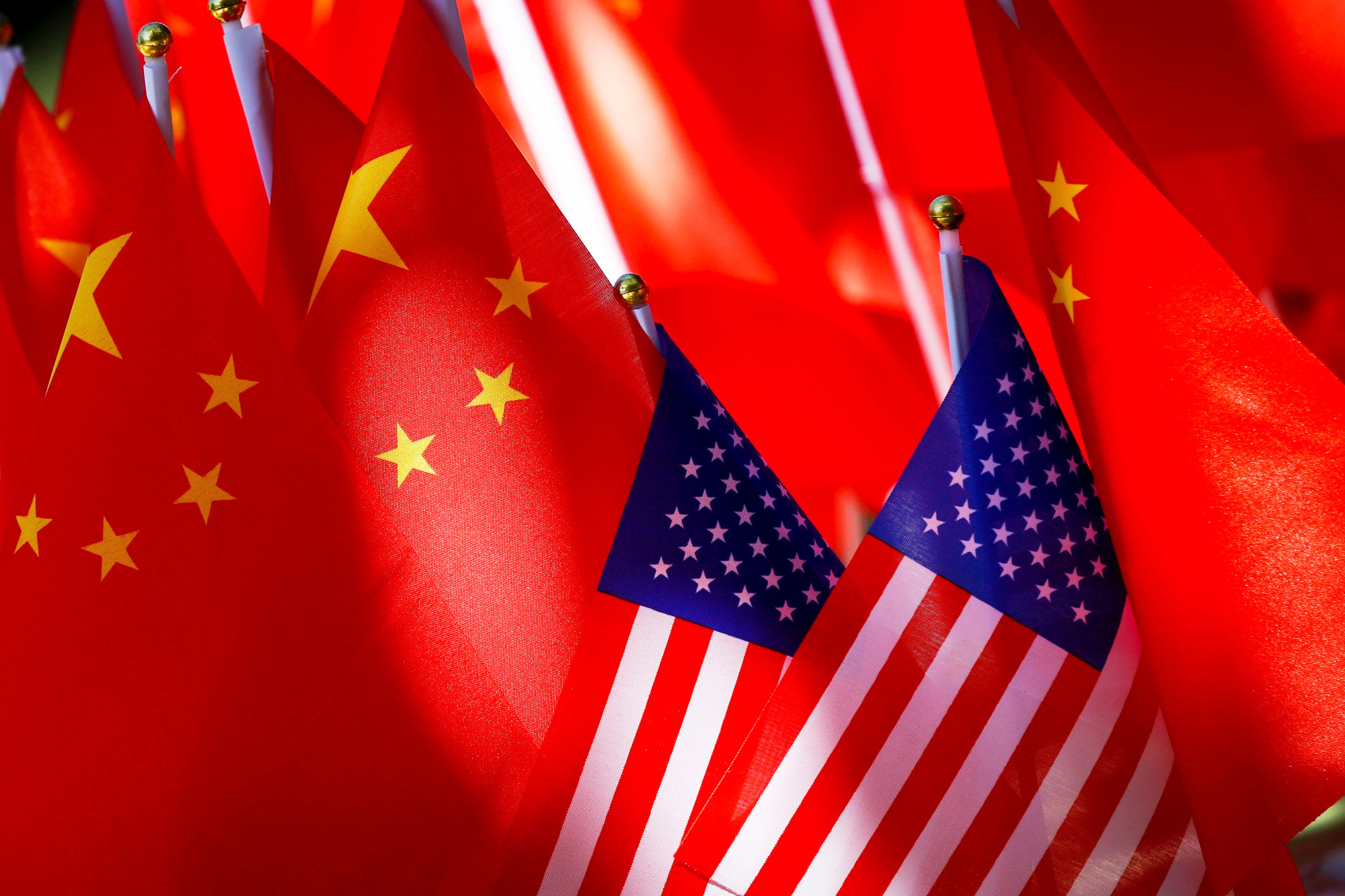
There are “huge grounds” for the US and China work together to fuel their self-interests, says Singapore’s Senior Minister Tharman Shanmugaratnam. Photo: AP
The minister did not directly mention former US President Donald Trump in his remarks, but noted that there was a “step change” in the threat perception about China in the US in 2016 – when the nationalist ex-president was elected – even though there had been a gradual move of sentiment in that direction for some time.
“I don’t think that step change in the curve was occasioned by any new strategy on the part of China or any new development in China’s market share or China’s actions in any regard. It was domestic politics,” Tharman said. “Politics matters, and I think we are trundling down a road where we are in the politics of pessimism and grievance and it has to be redressed.”
Asked whether mainland China under President Xi Jinping had fuelled the West’s concerns about it through actions and rhetoric, including on Taiwan, Tharman suggested serious observers of Asia’s biggest economy had a more nuanced view.
First, these observers noted that “China doesn’t yet feel it is ready to be an equal with the US at the centre stage” but wanted to play a more major role in rule setting in the International Monetary Fund, the World Bank, in trade and other areas, Tharman said.
On Taiwan, Tharman said “no serious observer, including those who are very close observers and who are engaged in this believes that China wants war with Taiwan”.
“Neither does the US. And it’s extremely important to preserve prior understandings on Taiwan, and preserve the constructive ambiguity on Taiwan that has lasted for decades on the part of both the US and China,” he said.
Beijing regards Taiwan as a breakaway province that must be reunited with the mainland – by force if necessary – and has steadily ramped up military pressure on the self-ruled island.
US, China have ‘irreconcilable differences’ but can coexist: Singapore minister
25 May 2023
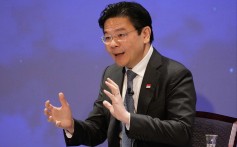
The US, like most countries, does not officially recognise Taiwan as a sovereign state, but opposes any attempt to change the status quo by force and is legally bound to help the island defend itself.
In a speech before he fielded questions during Tuesday’s dialogue session, Tharman – a former central bank chief – took aim at what he said was a rising trend in many countries of formulating industrial and foreign policy on protectionist terms that prioritised “relative superiority” rather than “absolute performance of policies”.
“If we go for a system that is protectionist, that imposes restrictions … where your actions domestically have negative spillovers on the rest of the world, you might be able to preserve relative superiority, at least for some period of time,” Tharman said. “But it is almost certainly at a cost of absolute performance everywhere.”
Tharman says there are ‘no saints’ in US-China relations and calls on the superpowers to cooperate in areas of common ground, such as ensuring fair trade
US politics since 2016 had occasioned a ‘step change’ in how China is increasingly viewed as a threat and such ‘politics of pessimism and grievance’ must be redressed, Tharman adds
Bhavan Jaipragas
13 Jun, 2023
SCMP

Singapore’s Senior Minister Tharman Shanmugaratnam at the Chatham House dialogue session on June 13, 2023. Photo: Handout
The United States and China should abandon the “hubris” of claiming superiority of their respective political systems and instead should focus on collaborating to advance their self-interests, top Singapore minister Tharman Shanmugaratnam has said.
Speaking at the Chatham House think tank in London on Tuesday, the senior minister echoed calls made by other regional leaders for the superpowers to cooperate in areas where they had common ground.
Tharman, who is Coordinating Minister for Social Policies, is among a handful of senior Singapore ministers whose views on US-China ties are parsed by international observers as a means to understand the prevalent middle-ground view about the superpowers in Southeast Asia.

Singapore’s Senior Minister Tharman Shanmugaratnam says China is deeply inserted in the liberal economic order and has a deep interest in its preservation. Photo: Handout
The 66-year-old last week announced he was stepping down from the long-dominant People’s Action Party (PAP) to run for the largely ceremonial position of president – a role he said he would use to “project Singapore’s interests and voice of reason in an increasingly turbulent world”.
Asked during a question-and-answer session on what advice he would give to the leaders of China and the US, said “there were no saints” in the relationship between the superpowers.
“Both of them need to make adjustments. Both of them need to avoid a sense of hubris with regard to the superiority of their own systems,” Tharman said.
“And both of them need to recognise that there’s actually a great deal in common in the way they go about trying to improve lives and grow incomes,” the minister said, noting that China, unlike the erstwhile Soviet Union, was “deeply inserted in the liberal economic order and has a deep interest in its preservation”.
“Those are huge grounds for seeing eye to eye and developing rules to make sure that trade is fair, investment is fair and intellectual property is protected. These are rules that can be developed,” Tharman said.
The absence of a strategy of interdependence would not necessarily mean that China “gradually withers away”, he said.
“It eventually rises anyway … but when it finally gets there it will know who made it extremely difficult for it to get there. That makes for a dangerous world,” he said.

There are “huge grounds” for the US and China work together to fuel their self-interests, says Singapore’s Senior Minister Tharman Shanmugaratnam. Photo: AP
The minister did not directly mention former US President Donald Trump in his remarks, but noted that there was a “step change” in the threat perception about China in the US in 2016 – when the nationalist ex-president was elected – even though there had been a gradual move of sentiment in that direction for some time.
“I don’t think that step change in the curve was occasioned by any new strategy on the part of China or any new development in China’s market share or China’s actions in any regard. It was domestic politics,” Tharman said. “Politics matters, and I think we are trundling down a road where we are in the politics of pessimism and grievance and it has to be redressed.”
Asked whether mainland China under President Xi Jinping had fuelled the West’s concerns about it through actions and rhetoric, including on Taiwan, Tharman suggested serious observers of Asia’s biggest economy had a more nuanced view.
First, these observers noted that “China doesn’t yet feel it is ready to be an equal with the US at the centre stage” but wanted to play a more major role in rule setting in the International Monetary Fund, the World Bank, in trade and other areas, Tharman said.
On Taiwan, Tharman said “no serious observer, including those who are very close observers and who are engaged in this believes that China wants war with Taiwan”.
“Neither does the US. And it’s extremely important to preserve prior understandings on Taiwan, and preserve the constructive ambiguity on Taiwan that has lasted for decades on the part of both the US and China,” he said.
Beijing regards Taiwan as a breakaway province that must be reunited with the mainland – by force if necessary – and has steadily ramped up military pressure on the self-ruled island.
US, China have ‘irreconcilable differences’ but can coexist: Singapore minister
25 May 2023

The US, like most countries, does not officially recognise Taiwan as a sovereign state, but opposes any attempt to change the status quo by force and is legally bound to help the island defend itself.
In a speech before he fielded questions during Tuesday’s dialogue session, Tharman – a former central bank chief – took aim at what he said was a rising trend in many countries of formulating industrial and foreign policy on protectionist terms that prioritised “relative superiority” rather than “absolute performance of policies”.
“If we go for a system that is protectionist, that imposes restrictions … where your actions domestically have negative spillovers on the rest of the world, you might be able to preserve relative superiority, at least for some period of time,” Tharman said. “But it is almost certainly at a cost of absolute performance everywhere.”
No comments:
Post a Comment